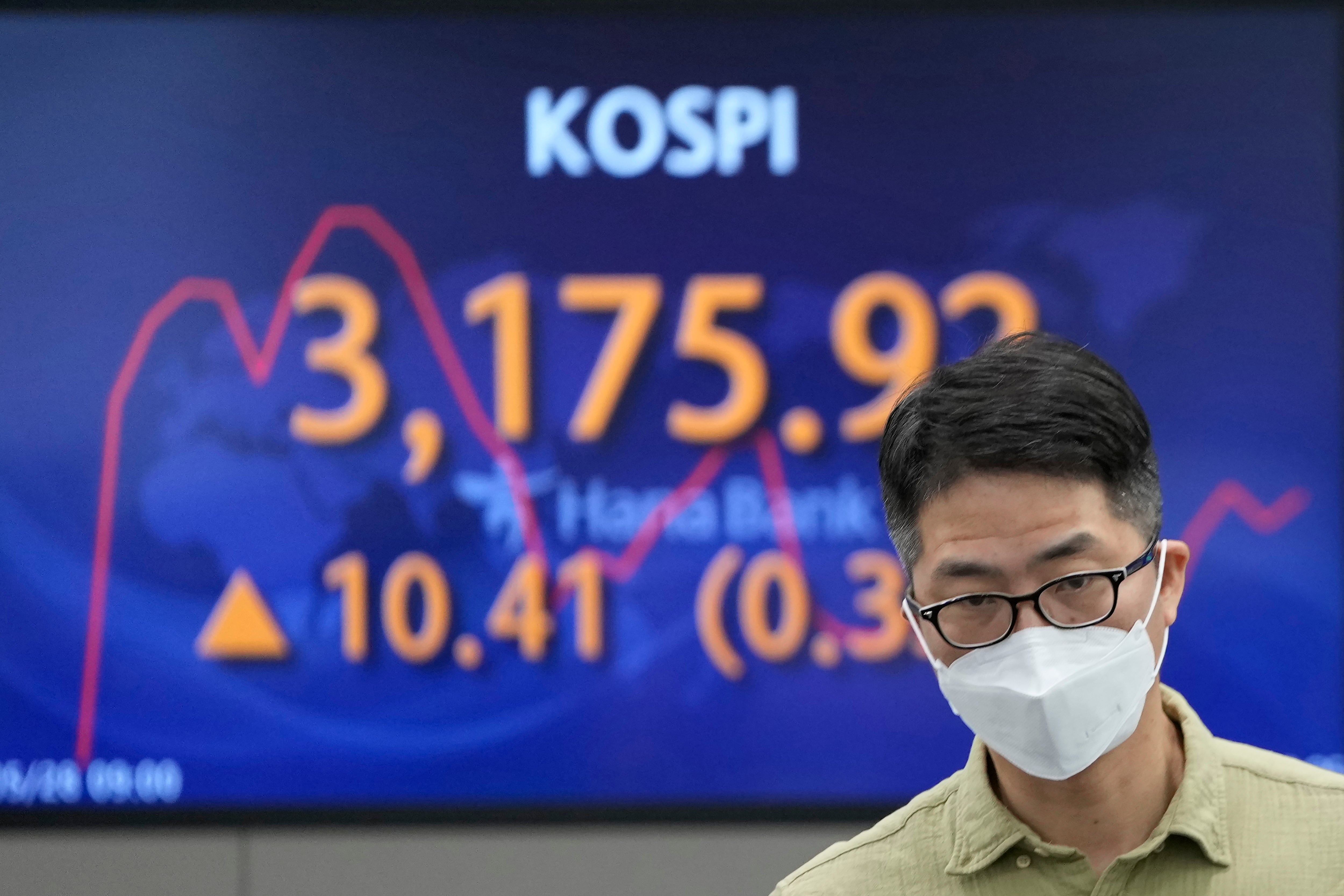Asian shares mostly higher on upbeat US jobs, growth data
Asian shares are higher, powered by encouraging signs that the U.S. economy is recovering from the pandemic

Your support helps us to tell the story
From reproductive rights to climate change to Big Tech, The Independent is on the ground when the story is developing. Whether it's investigating the financials of Elon Musk's pro-Trump PAC or producing our latest documentary, 'The A Word', which shines a light on the American women fighting for reproductive rights, we know how important it is to parse out the facts from the messaging.
At such a critical moment in US history, we need reporters on the ground. Your donation allows us to keep sending journalists to speak to both sides of the story.
The Independent is trusted by Americans across the entire political spectrum. And unlike many other quality news outlets, we choose not to lock Americans out of our reporting and analysis with paywalls. We believe quality journalism should be available to everyone, paid for by those who can afford it.
Your support makes all the difference.Asian shares rose Friday, powered by encouraging signs that the U.S. economic recovery from the pandemic is gaining momentum.
President Joe Biden s proposal fo r a $6 trillion budget also boosted buying of shares likely to benefit from heavy government spending.
Tokyo s Nikkei 225 index climbed 2.1% and other regional benchmarks all were higher.
Shares in Chinese online retail giant JD.com Inc.’s logistics arm rose 4.3% on their first trading day in Hong Kong after it raised 24 billion Hong Kong dollars ($3.1 billion) by selling a portion of the unit to outside investors.
JD Logistics Inc. is the latest technology company to list in the semi-autonomous Chinese city as Beijing steps up scrutiny of the industry. Its IPO was the second largest for the market this year after short video firm Kuaishou raised $5.3 billion.
Markets were lifted by mostly positive reports. The number of Americans who filed for unemployment benefits fell yet again to a pandemic low of 406,000.
Although the Commerce Department reported that sales of durable goods fell 1.3%, it also released updated data showing the U.S. economy grew at a 6.4% annual rate in the first quarter as growing numbers of people got vaccinated, allowing the economy to shift back toward normal activity.
The “optimism around U.S. economic data is boosting the recovery theme and may potentially spur some catch-up growth in Asia indexes, considering that they have been lagging," Jun Rong Yeap of IG said in a commentary.
Tokyo added 600 points to 29,149.41 while the Hang Seng in Hong Kong advanced was flat at 29,123.51. In Seoul, the Kospi jumped 0.7% to 3,188.73. The Shanghai Composite index shed 0.4% to 3,595.41 and Sydney's S&P/ASX 200 added 1.2% to 7,179.50.
On Thursday, the S&P 500 rose 0.1% to 4,200.88. It was on track for a gain this week of about 1%. It hit an all-time high on May 7th but then fell for two straight weeks.
Industrial and financial stocks were among the biggest gainers. General Electric jumped 7.1% for the biggest gain in the S&P 500, while Boeing rose 3.9% and JPMorgan Chase added 1.6%. Those gains were tempered largely by slide in technology companies. Health care and household goods makers also lagged the broader market. Treasury yields and energy prices rose.
The Dow Jones Industrial Average gained 0.4% to 34,464.64. The slide in technology stocks left the Nasdaq essentially flat. It slipped less than 0.1% to 13,736.28.
In another signal that investors were confident about the economy going forward, the Russell 2000 index of smaller stocks fared better than the broader market, picking up 1.1% to 2,273.07.
Online medical scrubs seller Figs surged 36.5% in its stock market debut, valuing the 8-year old company at $4.8 billion.
As they keep an eye on inflation, investors are looking ahead to Friday's release of the Commerce Department's personal consumption expenditures index, more commonly referred to as PCE. The Federal Reserve, whose job is to monitor and control inflation to the extent it can, relies on PCE data more than the better known consumer price index, or CPI, when making policy decisions.
Analysts have said they believe price increases are mainly due to the rebound from the slump brought on by the pandemic. Should they persist, the worry is that the Fed will tighten policy and raise interest rates to try to cool it.
Bond yields have nudged upward this week. The 10-year U.S. Treasury note was trading at a yield of 1.62% on Friday, up from 1.57% on Wednesday. But it has remained around that level for the last two weeks.
In other trading, U.S. benchmark crude oil gained 3 cents to $66.88 per barrel in electronic trading on the New York Mercantile Exchange. It picked up 64 cents to $66.85 on Thursday. Brent crude, the international pricing standard, gave up 6 cents to $69.14 per barrel.
The dollar rose to 109.91 Japanese yen from 109.83 yen late Thursday. The euro slipped to $1.2176 from $1.2196.